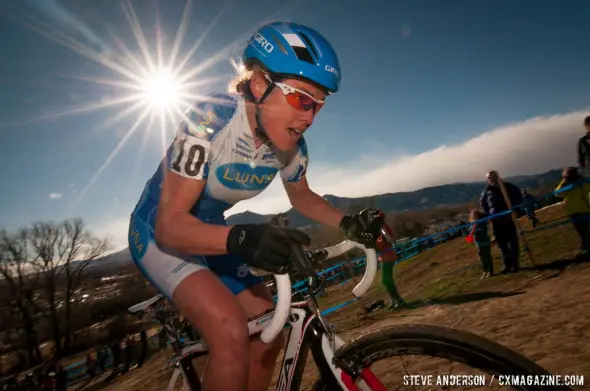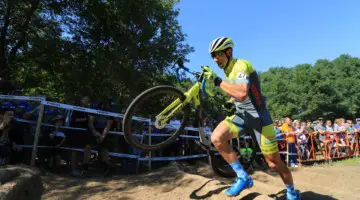One of the beauties of cyclocross is the relatively small training time commitment. ’Cross is a 60 minute (or less) affair. With such a short race, you might be wondering how to train for cyclocross if you’re coming from a road or mountain bike background where races are often multi-hour events. We’re here to help!
The average racer has no need to spend more than two hours on any given training ride. With a little creativity and schedule-shuffling, even with busy lives can still race competitively. Parents can still find a nice balance between training and family time. Our Coaching Corner is a good place to start looking for training advice and work-out ideas, and each issue of our magazine features at least one article on training—in fact, Issue 25 will have three! A few years back, coach Mike Birner helped us come up with some great cyclocross training plans, and while times have changed a bit, the plans still work well today.
If you can barely squeeze in a single training ride during the week and you’re just starting out, don’t worry. Line up for the beginner race because it’s very likely you’ll be able to hang out in the middle of the pack. Combined with a weekend race effort, that training ride should be enough to carry your fitness over to the next weekend.

Like ’cross? Get ready to suffer. Georgia Gould at Elite Women 2014 USA Cyclocross Nationals. © Steve Anderson
Those who have more time to train during the week will most likely be able to hold their own in the higher level races, with some practice. Even if you’re strapped for time, adding some high intensity training is perfect for the fast pace and short duration of a ’cross race. And if you’re racing most weekends, you’re in luck, since that means you need to make sure you’re incorporating rest days before and after your races. Allowing your body to recover after a race day will help prevent fatigue from taking a toll—that leaves Fridays and Mondays largely as rest days for the average racer!
Don’t forget that cyclocross is a largely skill-based sport, and as such, technique matters just as much as fitness. All the road rides in the world won’t make you better at barriers, so consider taking one or two days per week to focus on skills like cornering, barriers and even (groan) running. Attending a skills clinic or hiring a coach for a skills session is another great option to increase your race speed without adding a ton of hours to your regular weekly training.
Don’t forget, training needs vary from person to person. The advice here and on the website may not be tailored or detailed enough for you, and your best friend’s training plan may not be a perfect fit either. If you’re serious about ’cross, think about hiring a coach to at least help work out a basic training schedule—even a newbie can benefit from some structure, and veteran racers may be amazed by what they accomplish with some guidance!
Get schooled in cyclocross with our Cyclocross Academy class list here, and make sure you’re subscribed to Cyclocross Magazine, your guide for getting into the sport, and upping your ’cross knowledge. Not subscribed yet? For the newbies, our Issue 21 has a great feature on buying your first cyclocross bike, and Issue 22 has a story on how to get into racing and what to expect at your first race.





























